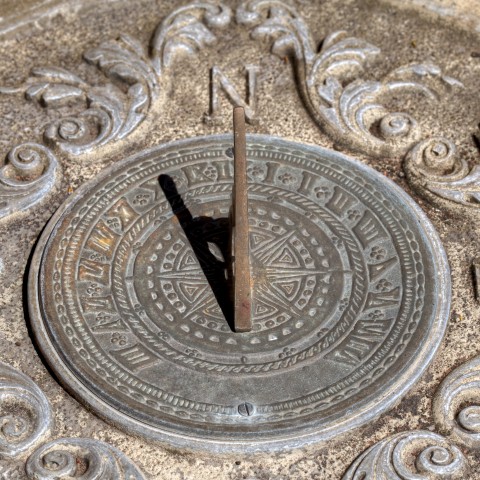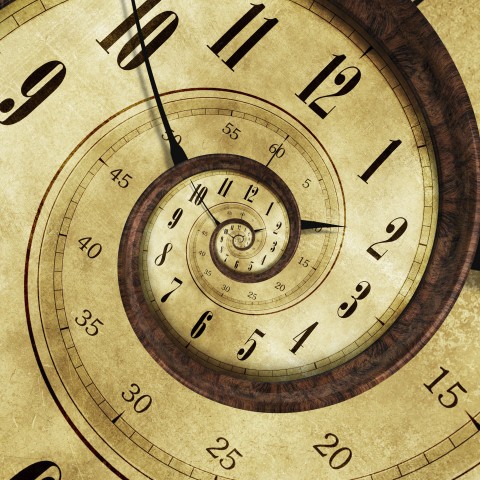
Do you sometimes get the impression that time is flying away, riding a winged clock out of your reach, or is it just me? Flying or not, time is the single most precious thing we have, and being able to discuss it will prove useful within your first few days in France.
Whether you want to talk about your day, plan something, talk about schedules, or just answer someone on the street asking you for the time, learning about telling time in French is essential. You’ll have to know the basic vocabulary for “hour” or “minutes” in French, some numbers, and a variety of valuable time-related phrases and keywords.
In this article, you’ll learn everything about telling the time in French, from the units to the AM / PM system, common questions & answers, and much more!
 Table of Contents
Table of Contents
- What Time is it?
- Time Units
- AM or PM?
- How to Give the Time
- Hour Divisions
- From Dusk till Dawn
- Expressions and Proverbs about Time in French
- How FrenchPod101 Can Help You Learn More French
1. What Time is it?

Le temps presse ! (“Time is of the essence!”)
Before you learn how to tell the time in French, you’ll need to understand when someone is asking you for it. And in the process, you’ll learn how to ask for the time yourself. As you can expect, there isn’t only one way of asking about time in French, but the most popular, by far, is:
- Quelle heure est-il ? [Formal]
“What time is it?”
If you have some experience with polite sentences, you may have noticed the inverted subject (est-il instead of il est). Indeed, this is the formal sentence that most French lessons teach you, but there are several other ways you can ask (or be asked) for the time:
- Quelle heure il est ? [Casual]
- Il est quelle heure ? [Casual]
Both of these phrases mean “What time is it?”
Let’s have a look at other popular alternatives:
- Est-ce que vous avez l’heure ? [Formal]
- Est-ce que tu as l’heure ? [Casual]
- T’as l’heure ? [Very casual]
These translate to “Do you have the time?”
And of course, if you’re asking some stranger in the street or anyone you’re not yet familiar with, don’t forget to add some honey by starting with a polite Excusez-moi (“Excuse me”), and maybe a nice s’il vous plaît (“please”) at the end!
- Excusez-moi, est-ce que vous avez l’heure, s’il vous plaît ? [Very formal]
“Excuse me, do you have the time, please?”
2. Time Units

Before we get to the juicy part, let’s talk vocabulary for a moment. Obviously, to give the time in French, you’ll have to be in the clear about numbers. At the minimum, you need to be able to count up to fifty-nine, but don’t worry if you can’t do that yet—we also have some magic words to save you the trouble!
However, I would say that counting up to 12 is an absolute minimum, so just in case, let’s review this quickly:
| 1. un | 2. deux | 3. trois | 4. quatre | 5. cinq | 6. six |
| 7. sept | 8. huit | 9. neuf | 10. dix | 11. onze | 12. douze |
- → Learn how to count from 0 to infinity with our complete guide on French Numbers. It’s available for free on FrenchPod101!
Now, here are our time units:
- une heure (“hour”)
- une minute (“minute”)
- une seconde (“second”)
So, what happens when you combine these words with numbers?
- Trois heures (“three hours”)
- Dix minutes (“ten minutes”)
- Trente secondes (“thirty seconds”)
And here’s a glimpse of how to tell time in French with minutes, though we’ll go more into this later.
- Cinq heures vingt (“five hours twenty minutes”)
In most cases, when the number of minutes closely follows the hour, like above, you can omit the word minutes (“minutes”).
- → You’ll find these words, as well as the numbers, in our free vocabulary list on Talking about Time with audio recordings to practice your pronunciation!

Un cadran solaire (“A sundial”)
3. AM or PM?
Frequently asked question: Should I use the twelve- or twenty-four-hour system in French?
Answer: As you wish! (But there is a twist.)
The twelve-hour system used to be popular in northern Europe, but nowadays, it’s slowly losing the battle against the objectively superior twenty-four-hour system. Let’s see how it looks.
- Il est 5 heures du matin. (“It is 5 AM” or literally “It is five hours in the morning.”)
- Il est 5 heures de l’après-midi. (“It is 5 PM” or “It is five hours in the afternoon.”)
- Il est 8 heures du soir. (“It is 8 PM” or “It is eight hours in the evening.”)
Dealing with twelve hours makes it easily confusing when you’re talking to someone from the same time zone, but it gets ridiculous with globalization and our tendency to communicate and schedule events with people from all around the world.
Now, if you also consider that AM (which stands for “Ante Meridiem,” as opposed to “Post Meridiem”) could possibly be the abbreviation for après-midi (French for “afternoon”), you’ll understand why it’s losing in popularity.
Let’s see what the twenty-four-hour system looks like:
- Il est 5 heures. (“It’s 5 AM.”)
- Il est 17 heures. (“It’s 5 PM.”)
- Il est 20 heures. (“It’s 20 PM.”)
Now that being said, there are still MANY people using the twelve-hour system. It’s not even old-fashioned yet and you should be ready to understand it, even if you choose not to use it yourself.
And as tempting as it was to add a lecture on the Latin origin of meridiem, I’m all about self-control and will keep my sophisticated pedantism in check. Hey, did you know “pedant” comes from the Italian “pedante,” derived from the Latin “paedogogus?” Oh no, I did it again!

Most hated object in the house: The alarm clock!
4. How to Give the Time
Alright, I’ve kept you waiting long enough. Here’s how to tell the time in French:
- Il est _____. (“It is _____”).
Did it feel anticlimactic? I feel like it’s not quite the big reveal.
Okay, but that’s not all of it! Here’s how you can make it more interesting:
- Il est 8 heures. (“It is 8.”)
- Il est bientôt 8 heures. (“It is 8 soon.”)
- Il sera bientôt 8 heures. (“It will be 8 soon.”)
- Il est presque 8 heures. (“It is almost 8.”)
- Il est 8 heures passées. (“It is past 8.”)
- Il est encore 8 heures. (“It is still 8.”)
- Il n’est pas encore 8 heures. (“It is not 8 yet.”)
- Vers 8 heures. (“Around 8.”)
- Aux environs de 8h. (“Around 8.”)
- Il est 8 heures pile. (“It is 8 sharp.”)
Il est 8 heures pétantes. (“It is 8 sharp.”)
| Hold on, these two are interesting! Pile or tout pile is rather straightforward. When it’s not used for the time, you can find it as an equivalent of “sharp,” “exactly,” or “right,” as in: A midi pile. (“At noon sharp.”) On a pile 10 mètres carrés. (“We have exactly ten meters square.”) Il a visé pile au centre. (“He aimed right at the center.”) Il est 8 heures pétantes literally means “It is eight blasting hours,” or “It is eight farting hours.” In 1786 in Paris, there used to be a small canon next to the Palais-Royal. It was only forty centimeters long and was equipped with a magnifying glass to concentrate the sun’s rays. Every sunny day at noon sharp, it would set the gunpowder on fire and BOOM! |
And if you’re dealing with the twelve-hour system, don’t forget about the trinity of matin, après-midi, and soir:
- Il est 4 heures du matin. (“It is four in the morning.”)
- Il est 4 heures de l’après-midi. (“It is four in the afternoon.”)
- Il est 9 heures du soir. (“It is nine in the evening.”)

Il est 8 heures pile. (“It is 8 sharp.”)
5. Hour Divisions
I promised you a magic workaround if you don’t know all the numbers from 13 to 59. Here we are!
- Il est 8 heures et demi. (“It is half past 8.”) Literally: “It is 8 hours and half.”
- Il est 2 heures et quart. (“It is quarter past 2.”) Literally: “It is 2 hours and quarter.”
- Il est 3 heures moins le quart. (“It is quarter to 3.”) Literally: “It is 3 hours minus quarter.”
- Il est 9 heures moins 10. (“It is 10 to 9.”) Literally: “It is 9 hours minus 10.”
/! This only works in the twelve-hour system:
- Il est 8 heures et demi.
Il est 20 heures et demi.- Il est 20 heures 30.
6. From Dusk till Dawn

Now that we know how to ask for the time and tell the time in French, let’s get more vocabulary on the various moments of the day. Describing time in French becomes much simpler when you know how to say the general time.
Unless you’re living in Saint-Petersburg and partying throughout the endless white nights, or hiding from vampires during the thirty days of night in Utqiaġvik, Alaska, your typical day should start with a sunrise and end with a sunset.
Morning
|
Afternoon
|
Evening & Night
|

Un coucher de soleil (“A sunset”)
7. Expressions and Proverbs about Time in French
Did you notice that the French don’t ask “What time is it?” but “What hour is it?”
Many time-related French expressions are surprisingly similar to their English equivalent, but it’s interesting to see the differences:
- La nuit des temps [Literally: “The night of times”]
(“The dawn of times”)
- Ces derniers temps [“Those latest times”]
(“Lately”)
- En temps normal [“In normal time”]
(“Under normal circumstances”)
- En temps utile [“In useful time”]
- En temps voulu [“In desired time”]
(“In due time”)
- Chercher midi à quatorze heures. [“To look for noon at 2 PM”]
(“To look for unnecessary complications”)
And of course, we do have the infamous proverb: Le temps, c’est de l’argent. (“Time is money.”)
Even though we’re as deep into capitalism as any of our European neighbors, the average French doesn’t live by this proverb and people tend to think of time as a commodity and not just something they convert into cash.
And even without pondering about the things money can’t buy, there’s an Epicurean component to the French Art de vivre (“Art of Living”) that keeps people from being swallowed by their working life and helps them prioritize what they work for.

Passed time never comes back.
8. How FrenchPod101 Can Help You Learn More French

In this guide, you’ve learned everything about telling the time in French, from the common questions and answers to time units, vocabulary, and expressions. Did I forget any important time-related word or expression that you know? Do you feel ready to ask random French strangers for the time, or to answer when you’re asked for it?
Understanding time in French may take time. A good exercise to practice telling the time is simply to try and think in French when you look at your watch. Try to form the sentence in your head using what you’ve learned today, and you’ll soon become more comfortable. Just take it easy and go at your own pace. =)
FrenchPod101 also has tons of vocabulary lists with audio recordings and free resources to boost your studies and keep your French learning fresh and entertaining!
Remember that you can also use our premium service, MyTeacher, to get personal one-on-one coaching and practice with your private teacher. Using assignments, personalized exercises, and recorded audio samples —and by reviewing yours—they can help you improve your pronunciation much faster.
Happy learning on FrenchPod101!

About the Author: Born and bred in the rainy north of France, Cyril Danon has been bouncing off various jobs before he left everything behind to wander around the wonders of the World. Now, after quenching his wanderlust for the last few years, he’s eager to share his passion for languages.









